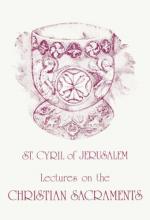|
This section contains 390 words (approx. 2 pages at 300 words per page) |
Encyclopedia of World Biography on Cyril, St.
St. Cyril (died 444) was bishop of Alexandria. A Doctor of the Church, he played a leading role in the controversies over the correct understanding of the person of Jesus Christ.
Nothing certain is known concerning Cyril's early years except that he was born in Alexandria and was the nephew of Theophilus, his predecessor as bishop of that city. He was a member of his uncle's entourage at the infamous Synod of the Oak, where Theophilus was successful in bringing about the deposition of John Chrysostom from his post as bishop of Constantinople. Having become bishop in 412, Cyril soon brought about the seizure of property belonging to the Novatianists, an austere Christian sect. He also instigated the virtual dissolution of the Jewish community in his city.
About 430 Cyril began his campaign to bring about the downfall of Nestorius, the bishop of Constantinople. The bishops of Alexandria generally had tended to resent the new and rising prestige of the See of Constantinople. More particularly, Cyril had a deep and quite sincere conviction that the theology of Nestorius represented a serious threat to authentic Christian confession of faith in Christ. Nestorius represented the suspect theological traditions of another great and rival Christian metropolis, Antioch, whence he had been called to Constantinople.
According to Cyril, the Church's traditional belief in the Incarnation requires the acknowledgment that God the Word, the second "person" of the Trinity, is himself the one and only subject, or agent, in every deed and word acted and spoken by Jesus Christ; this implies for him that Mary, the mother of Jesus, is to be called theotokos (she who bears God). Nestorius dissented from such teachings, fearing that they destroyed the full humanity of Jesus and detracted from the dignity of God.
The Emperor summoned a general council of bishops to adjudicate the matter at Ephesus in 431. Once there, Cyril himself convened the council and swiftly accomplished the condemnation of Nestorius before Eastern bishops friendly to the latter had arrived. After these irregular proceedings, Nestorius resigned voluntarily, and Cyril thereby accomplished one of his chief goals. Under government pressure in 433, however, Cyril made surprising concessions in reaching reconciliation with the more moderate of Nestorius's allies through a famous document, the Formulary of Reunion. Cyril's other writings include letters, theological and apologetic treatises, and commentaries on books of the Bible.
|
This section contains 390 words (approx. 2 pages at 300 words per page) |


